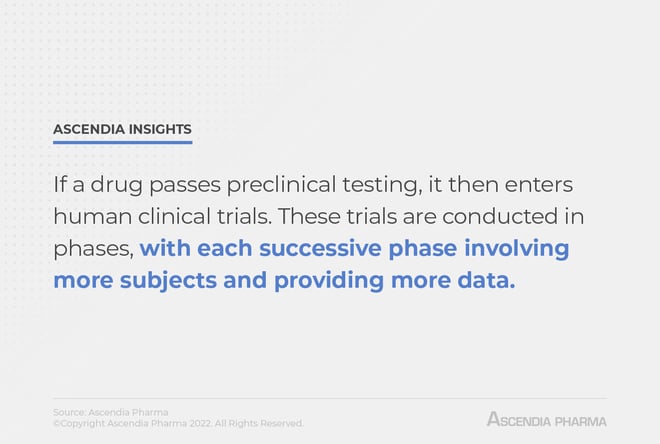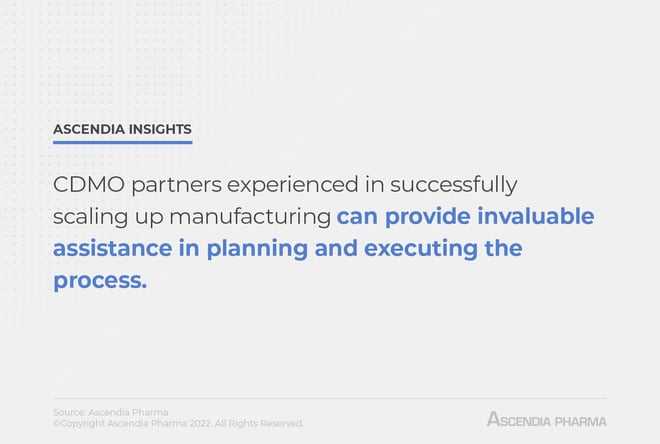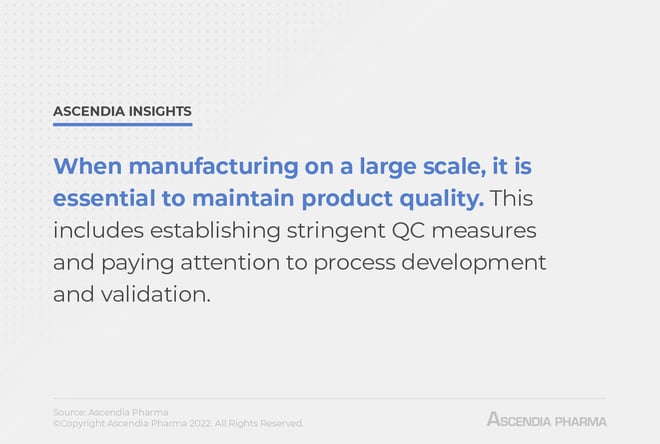How to Scale Up Pharmaceutical Manufacturing
There are many critical points in the drug development timeline, one significant milestone is scaling up manufacturing. This is the stage where a drug is produced on a larger scale for human clinical trials and eventual commercialization. The seamless scaling up of pharmaceutical manufacturing is essential for ensuring patient safety and maximizing the potential of success for a new drug when it goes to market.
There are many challenges that must be addressed in this process, but with careful planning and execution, it is possible to overcome them.
The Drug Development Timeline
 Before discussing scaling up, it's essential to understand where it falls in the overall drug development timeline. Drug development is a long and complex process, with many different steps—and sometimes many setbacks along the way.
Before discussing scaling up, it's essential to understand where it falls in the overall drug development timeline. Drug development is a long and complex process, with many different steps—and sometimes many setbacks along the way.
The process begins with drug discovery and formulation, in which an active drug is combined with other ingredients to create a dosage form. This is followed by preclinical testing, in which the safety and efficacy of the drug are evaluated in animal studies.
If the drug passes these initial tests, it then enters human clinical trials. These trials are conducted in phases, with each successive phase involving more subjects and providing more data. Clinical trials can be divided into four main phases:
Phase I: The drug is tested in a small group of healthy volunteers to assess its safety and the proper dose. Drugs must be manufactured according to cGMP guidelines for Phase I, as outlined by the U.S. Food and Drug Administration (FDA).
Phase II: The drug is tested in a larger group of people with the disease or condition that it is intended to treat to assess its effectiveness.
Phase III: The drug is tested in an even larger group of people to confirm its safety and effectiveness compared to existing treatments and to collect more information about possible side effects.
Phase IV: After the drug is approved for sale, additional studies may be conducted to assess its long-term safety and effectiveness.
Scaling up manufacturing occurs during Phase III of drug development after the drug has proven safe and effective in smaller groups of people. At this stage, the drug is at or close to the final dosage form that will be available on the market.
What Does It Mean to Scale Up Pharmaceutical Manufacturing?
Scaling up pharmaceutical manufacturing refers to the process of increasing production of a drug substance or product to meet the demand for clinical trials or commercialization. This requires significant changes to the manufacturing process, including:
- Adjusting the size of equipment and vessels
- Increasing the number of batches produced
- Implementing new quality control measures
- Optimizing the manufacturing process
- Ensuring compliance with regulatory guidelines
Each step must be carefully planned and executed to avoid problems that can jeopardize the quality or safety of the drug.
Safe, seamless, and smart scaling up of pharmaceutical manufacturing is essential for several reasons:
- To ensure patient safety. Before a new drug can be approved for sale, it must undergo extensive testing in clinical trials. These trials involve administering the drug to large numbers of trial participants, so it is essential that the manufacturing process is able to produce consistent, high-quality batches of the drug.
- To meet regulatory requirements. To be approved for sale, a new drug must meet strict quality standards set by regulatory agencies such as the FDA. These standards apply not only to the final product but also to the manufacturing process itself.
- To maximize commercial success. A new drug that is safe and effective is more likely to be successful commercially if it can be manufactured on a large scale. This allows for greater production efficiency and lower costs, which can make the difference between profitability and loss.
The Best Ways to Scale Up Pharmaceutical Manufacturing
One of the challenges in scaling up is that circumstances are never the same from one drug to the next. Still, there are some basic tips that apply to most cases:

Work with experienced partners
One of the most important things you can do is to work with experienced CDMO partners experienced in successfully scaling up manufacturing. These partners can provide invaluable assistance in planning and executing the process.
Plan for regulatory compliance early on
Regulatory compliance is a critical part of scaling up. Be sure to plan for it early on in the process to avoid delays or problems later.
Establish robust quality control measures
Quality control is essential at every stage of drug development, but it becomes even more important when manufacturing on a large scale, where the stakes are higher. Establishing robust quality control (QC) measures early on will help to ensure that the final product meets all regulatory requirements.
Pay attention to process development and validation
A key part of scaling up is developing and validating the manufacturing process. This includes defining process parameters, establishing critical control points, and testing for process efficacy. Robust documentation is essential when following cGMP guidelines.
Understand the impact of raw materials on your process
One of the challenges of scaling up is that raw materials can vary in quality and composition. This can have a significant impact on the manufacturing process, so it is important to understand how different raw materials will affect your manufacturing.
Be prepared for changes in your manufacturing process
As you scale up, you will likely need to alter your manufacturing process. Making laboratory-scale batches is a lot different than manufacturing hundreds or thousands of doses at a time. Yet these larger batches must all be of the same quality as those small batches made in your lab. Prepared for this by having a plan so changes are made quickly and efficiently.
Make sure your facility is designed for scalability
One important factor when scaling up is the facility design. Make sure that the facility is scalable so that changes can be made easily. Partnering with a CDMO eliminates this concern, as they already have what is required to pivot from small-scale to large-scale manufacturing.
Challenges in Scaling Up Pharmaceutical Manufacturing
There are a number of challenges that can arise when scaling up pharmaceutical manufacturing.
These include:

- Ensuring regulatory compliance. As mentioned above, regulatory compliance is critical when scaling up. Be sure to plan for it
early and work with experienced partners to avoid problems later. - Minimizing cost. One challenge of scaling up is to do so in a way that minimizes cost. This includes ensuring the efficient use of raw materials and maximizing production efficiency.
- Maintaining quality. When manufacturing on a large scale, it is essential to maintain product quality. This includes establishing stringent QC measures and paying attention to process development and validation. There’s a higher risk of contamination with scaling up, among other potential issues.
- Remaining flexible. Supply chains, raw material quality, and equipment issues can all be obstacles in the way of scaling up. Always have a Plan B ready in the wings.
Partner With Ascendia Pharmaceuticals
Ascendia Pharmaceuticals is an experienced CDMO that handles the drug development process, from initial formulation to early clinical trials and scaling up pharmaceutical manufacturing.
We have recently doubled our facility and invested in state-of-the-art equipment. Our experienced team knows how to overcome any unexpected challenges along the way.
Partnering with Ascendia as your CDMO is one way to ensure that your drug will reach on schedule and within budget. To learn more, contact us today.

